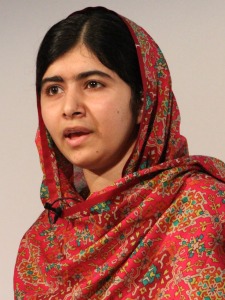Malala- For Better or for Worse?
Gender Inequality in Pakistan In June 2013, militants blew up a bus carrying female university students in Quetta, the capital of Pakistan’s southwestern Balochistan province. A nation where violence, repression, and gender inequity is uncommon, Pakistan is ranked by the World Economic Forum as the least gender equitable nation in Asia and the Pacific region. Women, not only live with discrimination, but are also occasionally “attacked and killed on account of asserting their rights to education, work and generally for choosing to have a say in key decisions in their lives”. A young girl who was brutally shot in the head by the Taliban for her advocacy for girl’s education has taken an international spotlight for Pakistan’s gender inequality issues.
A Young Girl Dreams
On 10 October 2014, Malala received the 2014 Nobel Peace Prize for her struggle for the right of education for all children.
At the age of 14, she received a death threat from one of the world’s most extremist fundamental groups – the Taliban. At age 15, a bullet entered her skull and she faced the brink of death. Malala Yousafzai began her activism in 2008 after the Taliban’s attacks on girls’ schools in Swat. She gave a speech titled “How dare the Taliban take away my basic right to education?” and began blogging for BBC in 2009. She was nominated for the International Children’s Peace Prize and was awarded the Pakistan’s National youth Peace Prize in 2011.
On October 9, 2012, Malala was returning home on her school bus when a man boarded the bus, demanded to know which girl Malala was, and fired at her. Malala was hit in the left side of her head. The bullet travelled down her neck leaving her in a critical condition. Two other girls were also injured in the attack. She had multiple surgeries, including repair of a facial nerve, to fix the paralyzed side of her face that received the bullet. Fortunately, Malala suffered no major brain damage and has now fully recovered. The incident, however, captured the international community’s attention.
The global community convened to support Malala’s cause. Petitions of over one million names were submitted to the United Nations in nearly 100 countries on every continent asking for the basic right to education in Pakistan. Mass media was also centered on Malala’s cause, broadcasting for worldwide access to education. Celebrities ranging from Justin Bieber to Usher spoke up for Malala in social media such as Facebook, Twitter, and other blogs.
Malala is currently the youngest Nobel Prize laureate.
A Rising Beacon of Hope – for better or for worse?
For many, Malala is a rising beacon of hope for changes and equality in nations like Pakistan. She is the light for those who have been suppressed by fundamentalism, extremism, and terrorism. She gives hope to other girls like herself who faced difficulties trying to obtain an education. She brought international attention onto the issue and instigated many to speak up against suppression and the right to basic education.
After the Taliban’s brutal assassination attempt on Malala, parents were at first afraid to send their children to school -- education in Pakistan for young girls remained on a tightrope. The anxiety kept many primary schools empty for a month. However, with Malala’s recovery and the global support she received, many have been inspired to reach out and demand for their educational rights.
"Before Malala was shot we didn't think we should go to school," says 10-year old Tasleem. "My Mum saw what happened on TV. That made her think. After this she decided her girls should also be in school and should get a good education."
With Aid workers and teachers beginning to fight back and lobbying parents about the need to educate their daughters, enrollment has begun to steadily rise. Pakistan has the second highest number of children out of school in the world, mainly girls. Educating the women of Pakistan would bring more qualified individuals into the society who could work towards the nation’s development.
However, Malala also receives much hate from extremists and conservative Pakistanis, mainly from the nation’s middle classes. Some are against bringing in international attention onto Pakistan’s issues in fear of damaging the nation’s image. There are also others who see Malala as a Western conspiracy, staged for the purpose of decrying Islam and promoting Western ideals. The hatred towards Malala stems mainly from conservatives who are against female empowerment, some being women themselves. Some women are even seen posting photos of Pakistani girls going to school to counter Malala’s “lies”.
Many fear change and uncertainty. A nation having lived amidst violence and oppression for decades, struggles to strive for changes with the fear of diving into a worsening state.

